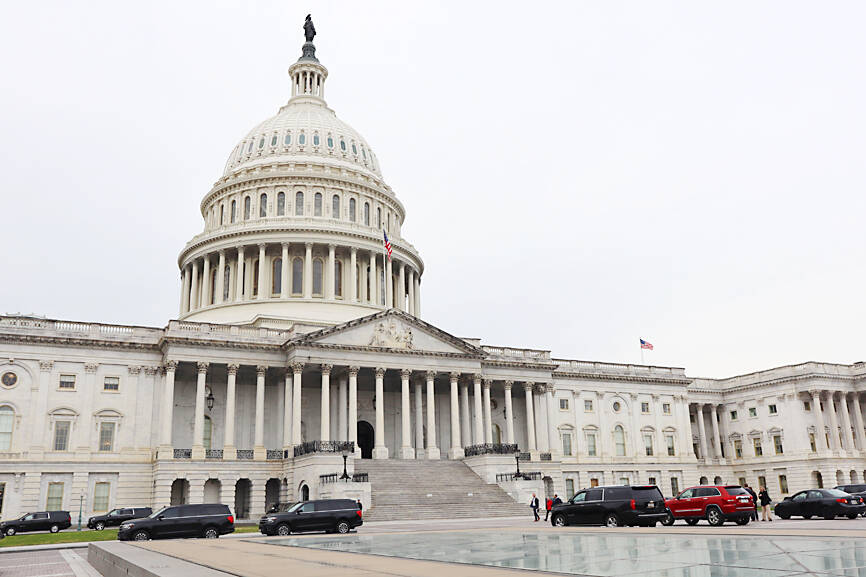The most recent version of the US’ National Defense Authorization Act (NDAA) for Fiscal Year 2025 includes increased support for Taiwan, US House of Representatives Speaker Mike Johnson said yesterday.
Johnson made the remarks at a news conference on Capitol Hill.
The NDAA, published on Saturday, would allow the US departments of defense and state to augment Taiwan’s military capabilities, such as anti-armor, radars, crewed and uncrewed aerial vehicles, cyberdefense, long-range precision weapons, integrated air and missile defense systems, anti-ship missiles, electronic warfare and counter-electronic warfare capabilities, secure communications equipment and other electronic protection systems.

Photo: CNA
The act authorizes a Taiwan Security Cooperation Initiative, modeled after the Ukraine Security Assistance Initiative, to enable Taiwan to maintain sufficient self-defense capabilities consistent with the Taiwan Relations Act. And the lawmakers have proposed military articles and training worth up to US$300 million to support Taiwan in the Act.
In concurrence with the US secretary of state, the secretary of defense may provide Taiwan’s military, government and other agencies with defense articles from the US inventory and services to help the nation maintain sufficient self-defense capabilities, according to the NDAA.
The US is to establish a joint program with Taiwan on general trauma care, amputation and amputee care, and any other mental health condition associated with post-traumatic stress disorder or traumatic brain injuries, it says.
According to Section 1324 of the act, the US Congress can invite Taiwan’s naval forces to participate in next year’s Rim of the Pacific exercise.
According to Section 5121, also known as Building Options for the Lasting Security of Taiwan through European Resolve (BOLSTER) Act, collaborations with the EU and the UK should be pursued on sanctions against the People’s Republic of China (PRC) if it overthrows or dismantles the governing institutions in Taiwan, or occupies any territory controlled or administered by Taiwan.
Imposing a naval blockade or quarantining Taiwan, seizing its outlying islands or initiating a cyberattack that threatens civilian or military infrastructure in the nation are grounds to issue sanctions, according to the BOLSTER Act.
The US president should tender a report to the Senate’s Committee on Foreign Relations and the House of Representatives’ Committee on Foreign Affairs on the expected economic impacts of a Chinese People’s Liberation Army (PLA) 30-day or 180-day blockade or quarantine of Taiwan, according to the NDAA.
The US and European countries should publicly and repeatedly emphasize the differences between their respective “one China” policies and the PRC’s “one China” principle to counter the PRC’s claims that UN Resolution 2758 recognizes the PRC territorial claims to Taiwan, it says.
European countries, particularly those with experience combatting Russian aggression, can provide Taiwan with lessons learned from their defense programs to mobilize the military and civilians in a time of crisis, it says.

Right-wing political scientist Laura Fernandez on Sunday won Costa Rica’s presidential election by a landslide, after promising to crack down on rising violence linked to the cocaine trade. Fernandez’s nearest rival, economist Alvaro Ramos, conceded defeat as results showed the ruling party far exceeding the threshold of 40 percent needed to avoid a runoff. With 94 percent of polling stations counted, the political heir of outgoing Costa Rican President Rodrigo Chaves had captured 48.3 percent of the vote compared with Ramos’ 33.4 percent, the Supreme Electoral Tribunal said. As soon as the first results were announced, members of Fernandez’s Sovereign People’s Party

EMERGING FIELDS: The Chinese president said that the two countries would explore cooperation in green technology, the digital economy and artificial intelligence Chinese President Xi Jinping (習近平) yesterday called for an “equal and orderly multipolar world” in the face of “unilateral bullying,” in an apparent jab at the US. Xi was speaking during talks in Beijing with Uruguayan President Yamandu Orsi, the first South American leader to visit China since US special forces captured then-Venezuelan president Nicolas Maduro last month — an operation that Beijing condemned as a violation of sovereignty. Orsi follows a slew of leaders to have visited China seeking to boost ties with the world’s second-largest economy to hedge against US President Donald Trump’s increasingly unpredictable administration. “The international situation is fraught

MORE RESPONSIBILITY: Draftees would be expected to fight alongside professional soldiers, likely requiring the transformation of some training brigades into combat units The armed forces are to start incorporating new conscripts into combined arms brigades this year to enhance combat readiness, the Executive Yuan’s latest policy report said. The new policy would affect Taiwanese men entering the military for their compulsory service, which was extended to one year under reforms by then-president Tsai Ing-wen (蔡英文) in 2022. The conscripts would be trained to operate machine guns, uncrewed aerial vehicles, anti-tank guided missile launchers and Stinger air defense systems, the report said, adding that the basic training would be lengthened to eight weeks. After basic training, conscripts would be sorted into infantry battalions that would take

GROWING AMBITIONS: The scale and tempo of the operations show that the Strait has become the core theater for China to expand its security interests, the report said Chinese military aircraft incursions around Taiwan have surged nearly 15-fold over the past five years, according to a report released yesterday by the Democratic Progressive Party’s (DPP) Department of China Affairs. Sorties in the Taiwan Strait were previously irregular, totaling 380 in 2020, but have since evolved into routine operations, the report showed. “This demonstrates that the Taiwan Strait has become both the starting point and testing ground for Beijing’s expansionist ambitions,” it said. Driven by military expansionism, China is systematically pursuing actions aimed at altering the regional “status quo,” the department said, adding that Taiwan represents the most critical link in China’s